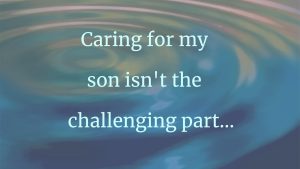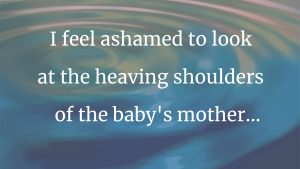The exam room bears an odor; it’s a musty sweetness, not unpleasant, but one that I know well–fetor hepaticus, a sign of severe liver disease.
My patient, Ms. Atkins, slouches on the exam table, brooding. She’s thirty-four years old, and an alcoholic. She is joined by her mother and her five-year-old daughter, Mari, who skips to my side, long braids bouncing off her shoulders.
“Hi, Doctor!” Mari reaches for my stethoscope, then turns to her mother, straightening her posture. With fierce concentration, she places the stethoscope against her momma’s belly. It’s become our routine during her mother’s office visits.
Ms. Atkins slowly raises her eyes to meet mine, and I am struck by the apathy in her gaze. It feels painfully familiar. I force down the aching in my chest and try to focus on my patient. Slowly, I register her shallow breaths, her distended abdomen, her swollen ankles spilling over her Crocs, the thickened, discolored skin telegraphing the chronicity of her condition.
Three weeks ago, she was admitted to the hospital for alcoholic hepatitis. She developed severe abdominal swelling and confusion, and then an overwhelming infection that landed her in the intensive-care unit for two weeks.
“I almost died,” she says, nonchalantly.
I’ve reviewed her hospital notes: Several times, as she recuperated, her care team offered her inpatient or outpatient chemical-dependency treatment; but she always declined.
Now, when I ask, she admits to drinking since she’s returned home.
“Not a lot. Just a couple of drinks.”
“Just a couple of drinks….” The words are familiar.
They weigh heavily in the air. Grandma’s eyes dart back and forth between us; I feel as if she’s silently pleading with me to help her daughter. Ms. Atkins, however, remains distressingly calm.
“I can quit on my own!” That’s what I used to tell myself–and I failed repeatedly.
I review her recent lab results. They’re worrisome, pointing to liver failure.
“I am very concerned about your drinking,” I tell Ms. Atkins, “and that you are advancing to alcoholic cirrhosis.” I see no comprehension in her eyes–just the vacant stare.
Eventually, the blinding realization hits me that I’m flailing. Standing in the bathroom early one morning, I struggle to meet my bloodshot eyes in the mirror. I am full of self-hatred and hopelessness.
“Well, I’m not drinking anymore,” Ms. Atkins says. When I ask, she admits to some cravings. I again offer her resources: medication, outpatient treatment, support groups.
“I’m not going to AA. That program is all about God and religion.”
I cry through my first AA meeting; big, powerful, heaving sobs. I can’t stop. It’s the first time I’ve said the word “alcoholic” and my name out loud in the same sentence. “Don’t get caught up on the Higher Power,” they say. “It can be the Universe, or other people in the program. You just have to be willing.”
I’m willing, but I am so ashamed. I am an alcoholic physician–a disgrace to my profession. That “A” is my scarlet letter.
I drag my attention away from my own memories and back to Ms. Atkins.
“AA is a support group intended to help you maintain sobriety,” I say.
She shakes her head. “No.”
Feeling conflicted, I don’t press further.
I have not told any of my patients about my own battle with alcohol use. Early in recovery, admitting it out loud to anyone, including myself, was a struggle. I shared it with a few colleagues, which fueled the rumor mill and led to intense feelings of shame. As time passed, I became comfortable sharing with others openly, but I felt that patients were different.
Now, with more than three years of sobriety, I’m trying find the courage to share my experience with Ms. Atkins, to let her know that I understand.
It was so hard. There were days when I didn’t think I would make it. “One day at a time.” I remember counting the hours, or just the minutes, when seeking to ease the mental anguish, but it got easier. Over time, I found hope, forgiveness and grace for myself. I found a resilience that I never knew I was capable of, followed by healing and joy.
I’m tiptoeing along the boundary between professional discretion and personal vulnerability–a mysterious and dangerous place. When I was a student, several of my mentors told me never to share personal details with patients. Most of the time, I don’t.
I used to smoke, though, and I often share that fact with patients who are trying to quit, as a way of acknowledging their struggle and letting them know that I understand how difficult it can be. As a primary-care physician, this kind of self-disclosure feels familiar and valid.
My patients ask often about my family and hobbies. They share pictures of grandchildren smearing cake on their face on a first birthday, of spouses at family reunions, of legions of children and memories. Sometimes I’m privileged to hear their fears about their health, and about the impact of new laws and policies on their lives. Sharing something from my own life, with the goal of helping a patient, seems safe.
More urgently, Ms. Atkins is going to die if she doesn’t get help. It feels like an obligation to extend this branch of hope.
Despite that, my fear persists. Looking at Ms. Atkins, I can feel the inner boundary line opening into a chasm that threatens to swallow me whole, and I’m terrified. I open my mouth, but my shame pulls me deeper into the pit, silencing me.
We finish our visit, and I schedule Ms. Atkins for an outpatient procedure to drain the fluid in her abdomen. We plan a follow-up visit within a month.
There’s nothing else I could do, I tell myself.
One month later, I’m sitting in clinic and reviewing discharge summaries. As I scroll through the list, a name appears on my screen: Ms. Atkins.
It’s a Death Summary.
My mouth goes dry. Shaking, and feeling my heart pounding, I click on her chart.
She was admitted again to the ICU, developed a rare lung complication and died two weeks later. She never sought treatment for her alcoholism.
Tears prickle my eyes. My throat tightens, and I’m overcome with an unexpected wave of grief. I’ve lost patients over the years, but this one feels more personal. It could have been me. Could I have made a difference? I reflect on our last meeting, my anxiety a weight in the pit of my stomach.
I call Ms. Atkins’ mother to share my condolences. I want to apologize for my cowardice, for my failure to reach out to her daughter, but I don’t have the words.
“How will I care for my granddaughter?” she asks, her voice full of anguish. As I hang up, my guilt and sorrow are suffocating.
I remember Mari running into the room and crawling into my lap, and the scent of her baby shampoo as she draped my stethoscope around her neck. In my mind, I wrap my arms around her.
I’m so sorry, I tell her. I failed.
I make a promise to myself, and to her: Next time, I will try to cross that invisible boundary–I will share my own personal story, so that my patient knows that I really do understand how hard it is, and will feel supported in the struggle.
I will try.









16 thoughts on “Coming Clean”
Pingback: A doctor’s promise: I will share my own drinking struggles with my patients so they know I understand – Get Fit Winnipeg
Thank you. Your reflection has made me again think about when it would be helpful to share my struggles with addiction and mental illness with my clients.
I often have had the same inner conflicts in these situations. Where do I draw the boundary? Will my disclosure be taken in confidence? Sometimes opening up would result in a stronger patient-doctor bond, sometimes it was a mistake. Discretion is a real art.
Thank you for you honesty. My older sister drank herself to death. Up until the final hours of her life, she held fast to her well defended denial that she was an alcoholic. That my sister brought up this topic to me in her final hours before her death remains the saddest moment to me.
I very seriously doubt that your sharing would have made any difference. Don’t beat up on yourself. Thanks for sharing.
I have no doubt that even though you struggled to convey your understanding in words, you conveyed it through your empathy – be kind to yourself
I experienced this exact situation with my daughter, who did not agree to treatment and died from liver failure. She had a six year old child. All of her family members wonder what they could have done to save her. “If only we had …”. Her physician was very involved and supportive but for whatever reason my daughter never accepted referrals to treatment programs. I will always wonder why.
This is such an important story, and so well and honestly told. Please do not take on a burden because you did not tell. You are a person and entitled to privacy. And one of the ways that the behavior of relentless self-destroyers (term is from Groves NEJM 1978) make us hurt is by our saying “If only I had done X, I might have saved her/him”. But one is up against deeply ingrained pathology, that all efforts usually can’t overcome self-destruction, and the fact is that we give all we can, but we cannot and must not exsanguinate trying. For we are not martyrs, only flawed and decent doctors who do the most good if we have something left for the next patient and the one after that. So please give yourself room to grieve but not to feel guilt.
Sharing my token is a easy way to open the door. I have found that it engenders respect and trust. Inspiration and hope. And a new resource.
I love this, Alisa! She had her own higher power and path. You may elect to being sharing more, you may not. I share my story with some criminal defendants I am prosecuting to give them hope and lends credibility to me telling them, “it is hard and you can do it!” Sharing an authentic piece of me has made my recovery that much stronger and is a silver lining of our disease! That ability to connect with others-priceless. Proud of you!
Thank you for caring so deeply. It helps me feel less alone in my chronic illness.
Thank you for sharing your story; I don’t believe that you need to share your own experience in order to convey your deep compassion and willingness to support your patients. You have described your ability to convey this to your patients in this story; their is a limit to the extent we as health professionals can influence patient autonomy despite our potential shared experience. It might have made a difference to share your experience in this situation; but maybe not. The logical conclusion of the argument that we should share these experiences ; is that we need to have experience of all of the many ways our patients can suffer in order to be of value to them. I don’t believe this; your willingness to be open to their pain is more important.
Such a moving and powerful story- thanks so much for sharing!
Thank you for having the courage to continue sharing your story.
Thank you for courageously sharing your moving story. I hope that the compassion for yourself continues to grow – compassion for you as a human being and as a physician. From my vantage point I would say you are succeeding.
This searing moment of vulnerable humanity is beautifully shared. Thank you.